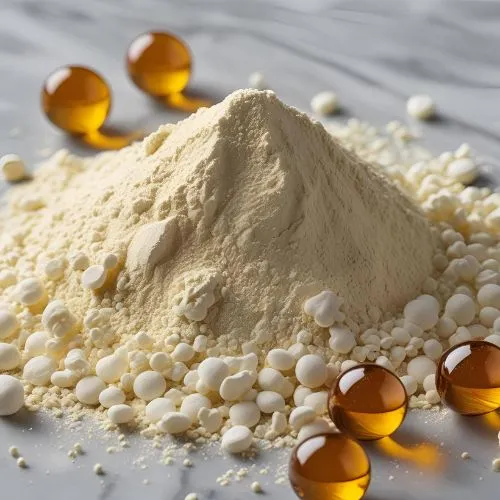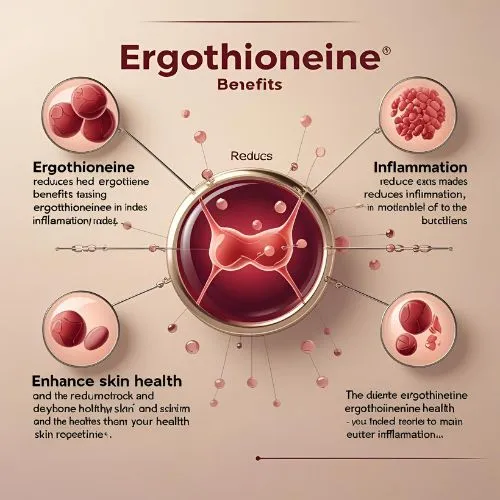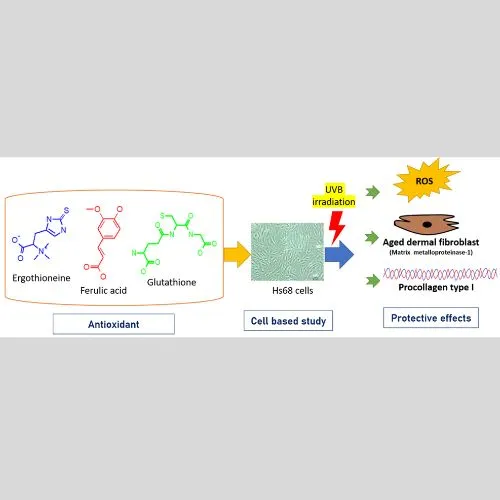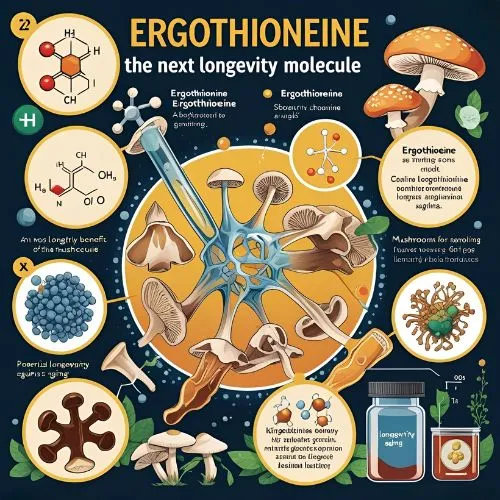Ergothioneine: A Powerful Antioxidant with Promising Potential
In the realm of health and wellness, a remarkable compound has been gaining attention for its potent antioxidant properties and potential to promote longevity. Ergothioneine, a naturally occurring amino acid, is emerging as a superstar in the world of nutrition and cellular protection. This blog post delves into the fascinating world of ergothioneine, exploring its health benefits, cellular protective mechanisms, and its potential as a longevity molecule.

Top Health Benefits of Ergothioneine Supplements
Ergothioneine, often referred to as the "longevity vitamin," offers a wide array of health benefits that make it a compelling addition to any wellness regimen. Let's explore some of the most noteworthy advantages of ergothioneine supplementation:
Cognitive Function Enhancement
One of the most exciting areas of ergothioneine research is its potential impact on brain health. Studies have shown a correlation between higher ergothioneine levels and improved cognitive performance, particularly in older adults. This powerful antioxidant may help protect brain cells from oxidative stress, potentially slowing cognitive decline and supporting overall mental acuity.
Cardiovascular Health Support
Ergothioneine's antioxidant properties extend to cardiovascular health as well. By combating oxidative stress in blood vessels and heart tissue, it may contribute to maintaining healthy blood pressure levels and supporting overall heart function. This makes it a valuable ally in promoting cardiovascular wellness.
Skin Health and Anti-Aging Effects
The beauty industry has taken notice of ergothioneine's potential anti-aging properties. Its ability to protect skin cells from oxidative damage may help reduce the appearance of fine lines and wrinkles, promoting a more youthful complexion. Additionally, it's role in cellular energy production could contribute to improved skin elasticity and overall skin health.
Liver Protection
Emerging research suggests that ergothioneine may have hepatoprotective properties, meaning it could help safeguard liver function. By mitigating oxidative stress in liver cells, it may support the organ's vital role in detoxification and metabolism.
Joint Health and Inflammation Reduction
Ergothioneine's anti-inflammatory properties make it a promising candidate for supporting joint health. By reducing oxidative stress and inflammation in joint tissues, this supplements may help alleviate discomfort and promote mobility, particularly in individuals with age-related joint issues.

How Ergothioneine Supports Cellular Protection?
The remarkable health benefits of ergothioneine stem from its unique ability to protect cells from various forms of damage. Let's delve into the mechanisms by which ergothioneine supports cellular protection:
Potent Antioxidant Activity
At its core, ergothioneine is a powerful antioxidant. It neutralizes harmful free radicals and reactive oxygen species (ROS) that can damage cellular components such as DNA, proteins, and lipids. This antioxidant activity is crucial in preventing oxidative stress, which is implicated in numerous age-related diseases and the aging process itself.
Mitochondrial Support
Ergothioneine has a special affinity for mitochondria, the powerhouses of our cells. By accumulating in these vital organelles, it helps protect them from oxidative damage. This support is essential for maintaining efficient energy production and overall cellular health.
DNA Protection
One of ergothioneine's most significant roles is in safeguarding our genetic material. By preventing oxidative damage to DNA, it may help reduce the risk of mutations and support genomic stability. This protective effect is particularly important in the context of aging and age-related diseases.
Cellular Stress Response Enhancement
Ergothioneine doesn't just passively protect cells; it also enhances their ability to respond to stress. Research suggests that it may activate cellular stress response pathways, helping cells adapt to and better withstand various forms of stress, including oxidative and environmental stressors.
Telomere Preservation
Telomeres, the protective caps at the ends of our chromosomes, play a crucial role in cellular aging. Preliminary studies indicate that ergothioneine may help preserve telomere length, potentially slowing cellular aging and promoting longevity at the cellular level.

Is Ergothioneine the Next Longevity Molecule?
As research on ergothioneine continues to unfold, many scientists are asking: Could this unique antioxidant be the next breakthrough in longevity science? Let's explore the evidence and potential of ergothioneine as a longevity molecule:
Evolutionary Conservation
One intriguing aspect of ergothioneine is its evolutionary conservation. Despite being unable to synthesize it, humans have retained a specific transporter for ergothioneine (OCTN1) throughout evolution. This retention suggests that it plays a crucial role in our biology, potentially contributing to our longevity and health span.
Cellular Longevity Promotion
At the cellular level, ergothioneine exhibits properties that align with longevity promotion. Its ability to protect against oxidative stress, support mitochondrial function, and potentially preserve telomeres all contribute to cellular health and longevity. These effects may translate to whole-organism benefits in terms of lifespan and healthspan.
Age-Related Disease Prevention
Many age-related diseases share common underlying factors, such as chronic inflammation and oxidative stress. Ergothioneine's multifaceted protective effects may help mitigate these factors, potentially reducing the risk of various age-related conditions and supporting healthy aging.
Synergy with Other Longevity Pathways
Emerging research suggests that ergothioneine may interact with other known longevity pathways, such as the sirtuin and mTOR pathways. These interactions could amplify its pro-longevity effects, making product a valuable component of comprehensive anti-aging strategies.
Future Research Directions
While the current evidence is promising, more research is needed to fully elucidate ergothioneine's potential as a longevity molecule. Future studies, particularly long-term human trials, will be crucial in determining the extent of ergothioneine's impact on lifespan and healthspan. As research progresses, we may gain deeper insights into how to harness ergothioneine's power for promoting longevity and overall health.

Conclusion
Ergothioneine stands out as a fascinating compound with immense potential in the fields of health, wellness, and longevity. Its powerful antioxidant properties, cellular protective mechanisms, and possible role in promoting longevity make it a subject of great interest for researchers and health-conscious individuals alike.
As we continue to unravel the mysteries of aging and seek ways to enhance our health and lifespan, ergothioneine emerges as a promising ally. Whether through dietary sources or supplements, incorporating it into our wellness routines may offer a range of benefits, from cognitive support to skin health and beyond.
For those interested in exploring the potential of ergothioneine supplements, it's always advisable to consult with a healthcare professional. If you're looking for high-quality products or have questions about its applications, feel free to contact us at info@yanggebiotech.com.
FAQ
Q: Can we get some samples to test before purchasing?
A: Of course, we can provide free samples of 20 to 100 grams, but the shipping cost is at the customer's expense. The shipping cost can be deducted from the next order, or the samples can be sent through your courier account.
Q: Do your products have relevant certifications?
A: Yes, our products are certified for HALAL, ISO, HACCP, Kosher, and other certifications.
Q: What is the minimum order quantity (MOQ)?
A: Small batches of samples can be customized according to your requirements.
Q: Do you offer OEM and ODM services? Can the formula be customized based on our own?
A: Of course, we provide ODM and OEM services to many customers. Our product range includes softgels, capsules, tablets, sachets, granules, and private label services. Simply contact us and let us know your requirements. Our experienced R&D team can also develop new products with specific formulas.
Please contact us to design your own branded products.
Q: How do you handle quality complaints?
A: First, we have a comprehensive quality control SOP. We provide authoritative third-party inspection reports for almost all products before shipment to minimize the possibility of quality issues. Second, we have a comprehensive return and exchange procedure. If there is a genuine quality dispute, we will strictly follow the SOP.
Q: How do you ship? How long does delivery take?
A: For small orders, we typically use DHL, UPS, EMS, FedEx, or TNT. Delivery typically takes 3-7 days. We also offer air and sea freight services. We have a strong freight forwarding team and can provide you with a one-stop service, including DDP and DDU.
Q: What are your payment terms?
A: 100% prepayment, payable by T/T, Western Union, MoneyGram, or PayPal.
Q: What is the shelf life of your products?
A: 2 years with proper storage.
Q: Is the packaging environmentally friendly?
A: We attach great importance to environmental protection and are constantly improving our product packaging. Some products are packaged in recyclable paper. Packaging materials are carefully selected to ensure product safety during transportation and storage, and to minimize environmental impact. We are committed to achieving a balance between environmental friendliness and practicality in our product packaging, and to contributing to sustainable development.
References
1. Halliwell, B., Cheah, I. K., & Tang, R. M. Y. (2018). Ergothioneine - a diet-derived antioxidant with therapeutic potential. FEBS Letters, 592(20), 3357-3366.
2. Cheah, I. K., & Halliwell, B. (2012). Ergothioneine; antioxidant potential, physiological function and role in disease. Biochimica et Biophysica Acta (BBA) - Molecular Basis of Disease, 1822(5), 784-793.
3. Ames, B. N. (2018). Prolonging healthy aging: Longevity vitamins and proteins. Proceedings of the National Academy of Sciences, 115(43), 10836-10844.
4. Cheah, I. K., Feng, L., Tang, R. M. Y., Lim, K. H. C., & Halliwell, B. (2016). Ergothioneine levels in an elderly population decrease with age and incidence of cognitive decline; a risk factor for neurodegeneration? Biochemical and Biophysical Research Communications, 478(1), 162-167.
5. Paul, B. D., & Snyder, S. H. (2010). The unusual amino acid L-ergothioneine is a physiologic cytoprotectant. Cell Death & Differentiation, 17(7), 1134-1140.

Based on your location and order quantity, you will have the opportunity to receive a limited time free shipping promotion!

Who we are


